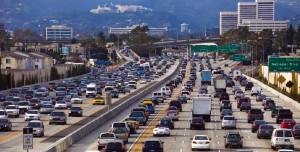With the White House unwilling to engage on the specifics of how to pay for its $556 billion transportation bill, members of Congress are studying the possibilities. Earlier this month, Senate Budget Committee Chair Kent Conrad (D-ND) asked the Congressional Budget Office to analyze the potential of a vehicle-miles-traveled fee as a fairer way to tax drivers.

The CBO came back last week with a report outlining the pluses and minuses of fuel taxes and the VMT fee. The report admirably assesses the full range of social costs from driving:
Any given driver's highway use also imposes costs on other users, on nearby nonusers, on the environment, and on the economy in the form of congestion, risk of accidents, noise, emissions of greenhouse gases and pollutants that affect local air quality, and dependence on foreign oil.
The CBO highlights the benefits of charging road users accurately for “the costs their travel imposes on society” to incentivize people to “limit highway use to trips for which the benefits exceed the costs, thus reducing or eliminating overuse of highways and helping identify the economic value of investments in highways.”
The pros and cons of the two options, according to the CBO:
Fuel tax (pro):
- Costs little to implement.
- Offers incentive to curtail fuel use, reducing some of the social costs of travel.
Fuel tax (con):
- Doesn’t create a strong enough disincentive for using the roads in ways that create greater social costs.
- Diminishes with greater fuel efficiency.
- Only produces about 2 cents per mile driven, although the national average cost for congestion caused by automobiles is about 10 cents per mile, and far higher in urban areas. (Factor in costs for noise and crashes and it jumps even higher.)
VMT (pro):
- Discourages trips for which costs exceed benefits.
- More accurately reflects the costs of using a highway than a gas tax.
- Can be used to charge different rates for different vehicle types, charging more for heavy trucks, for example, if the goal is to pay for road repairs.
- Can be used to charge different rates at different hours in different places (congestion pricing).
VMT (con):
- Its efficiency is reduced depending on how hard it is to implement the system.
- Triggers concerns about privacy, particularly if technology for congestion pricing is installed, allowing data to be kept on where and when a driver travels.
Both:
- Satisfy (in the eyes of some, including the CBO) a “user-pays” criterion.
- Create a higher burden on people who live in rural households, even if they don’t own cars, because of the increase in the prices of goods. Rural people who do drive often drive longer distances but experience less congestion than urbanites (making a gas tax cheaper for them) but often drive less fuel-efficient cars (making a VMT fee preferable).
The report wrestles with the different costs of different kinds of transportation: passenger cars (90 percent of all vehicles on the road) create far less wear and tear on the roads but accound for two-thirds of urban traffic congestion. And it explores some options for making VMT tracking palatable and efficient, including:
restricting the amount of information about a vehicle's travel that is used in billing or restricting the kind of information that is conveyed to the government; making devices appealing to the public by allowing businesses to use them to provide other services, such as real-time traffic reports or electronic payment for parking; and allowing users to opt out of paying per-mile charges and instead pay higher fuel taxes.
Meters could be required in all new cars but retrofitting old ones could be expensive and drawn-out – and the equipment could be more susceptible to tampering than factory-installed devices.
The CBO doesn’t make policy recommendations, so news reports stating that the CBO is “recommending” a shift to the VMT fee are overstating the facts. However, the CBO report is a good tool for policymakers and advocates who may want to make this recommendation themselves.





